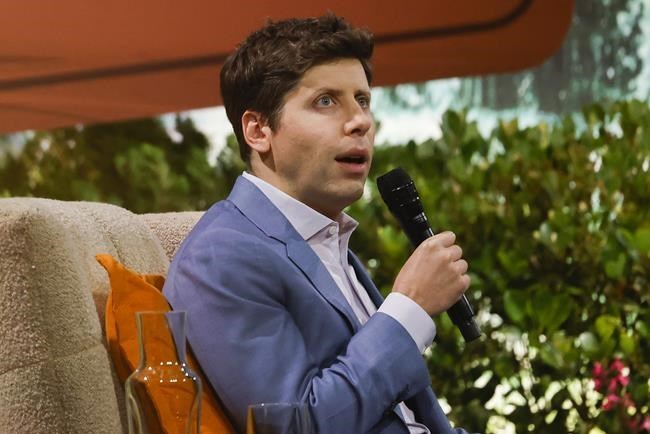TORONTO — One of the most prominent figures in the world of artificial intelligence is concerned about the technology's potential effects during election campaigns.
Sam Altman, chief executive of OpenAI, said he's worried about how good at personalized persuasion the technology may become.
"We also don't know for sure how big of an impact that might have or not, but it's an example of something new that I'm worried about because it's very unknown," Altman said in a virtual appearance Wednesday at a University of Waterloo technology conference hosted in Toronto.
Altman's company is best known for creating ChatGPT, a generative AI chatbot capable of humanlike conversations and tasks launched last November. The company has continued to advance the technology, spurring a race to innovate in the AI space with companies including Google, Anthropic AI and Microsoft.
Altman suggested such technology could help spread misinformation or aid in the creation of deep fakes — video, audio clips or photos where technology is used to make someone look, say or do things they have not done. Either could be used to disrupt an election, he said.
His comments come as the U.S. is preparing for a presidential election in 2024 and Canada's next federal election is slated for 2025. Both are being closely watched for signs of foreign interference as tensions with China, Russia and Palestine flare.Â
On Wednesday, Facebook and Instagram owner Meta Platforms Inc. announced guardrails around the use of AI on its social networks.
Starting in the new year, the company said advertisers will have to disclose whenever a social issue, electoral, or political ad contains a "photorealistic" image or video, or realistic sounding audio, that was digitally created or altered.
Aside from swaying elections, there have been additional worries from deep learning pioneers, including AI godfathers Geoffrey Hinton and Yoshua Bengio, that AI could promote fake news, trigger mass unemployment, create battle robots or even result in existential risk.
Altman addressed the job risks Wednesday.
"There will certainly be job change," he said.
"Some jobs will go entirely. Some jobs will change a lot in the way people spend their time on them and then some jobs will get created that are better than anything we can imagine."
Altman passed off the shift in jobs as natural, saying it's part of any evolution in how we work and something that occurred during the Industrial Revolution.
He urged companies worried about the shift to get all their staff experimenting with AI.
"The businesses we see having the most success are the ones that are just willing to try the tools," he said.
Asked by moderator Jimmy Lin, co-director of the Waterloo AI Institute, how businesses could motivate their staff to toy with AI more, Altman said experimentation is already happening.
"Our servers are melting all the time. We could actually use less people trying it," he said to laughs.
OpenAI's website said ChatGPT experienced a "major outage" impacting all services Wednesday morning.
This report by The Canadian Press was first published Nov. 8, 2023.
Tara Deschamps, The Canadian Press




